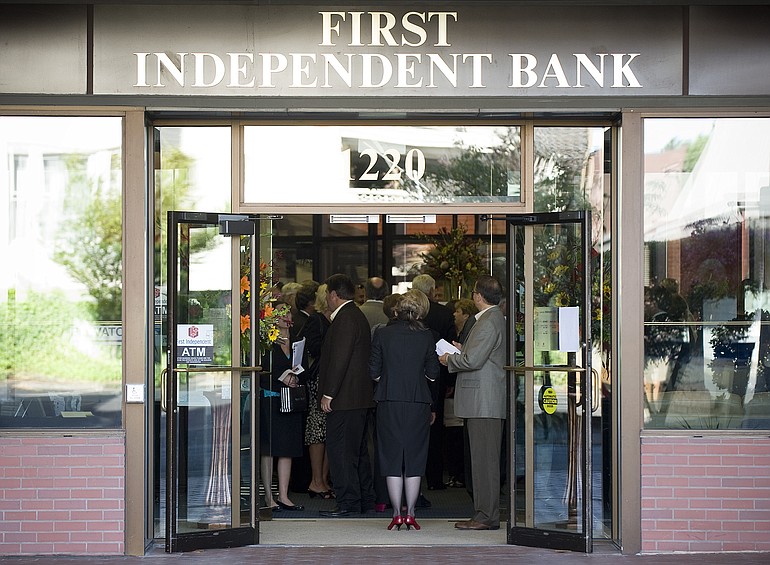It’s not often that a business reporting record losses congratulates itself on its success.
But that’s what’s happening at Vancouver-based First Independent Bank, where a $31.9 million one-year loss for 2010 is seen as the closing act in the three-year financial meltdown that shook the nation’s financial industry to its foundations. First Indy’s ability to recover from the devastating economic downturn is due in large part to $28 million in contributions from the Firstenburg family, owners of one of the nation’s last family-owned banks.
Taking a large loss in 2010 will allow First Indy, which celebrated its 100th anniversary last year, “to celebrate another 100 years, and not just talk about it,” said bank president Jeanne Firstenburg. “This is a time to put the recession and the flu symptoms behind us.”
In the past two years, the Firstenburg family has contributed $28 million to the bank in the form of cash and family-held real estate. In addition, the family-owned holding company First Independent Investment Group last year purchased millions of dollars in loans that were designated as troubled by the Federal Deposit Insurance Corp. That move reduces the need for deep reserves to back those troubled loans. The result is that First Indy has more money available to offer loans, which it would otherwise have to hold onto to meet regulatory standards.
The turnaround in the bank’s fortunes is already under way. Last month, First Indy issued $15 million in new loan commitments, up from just $3 million the previous January. It hopes to keep a strong pace on lending this year, which could help ease a common complaint from business leaders that banks have become too restrictive in their loans in the post-financial crisis era.
David Nierenberg, a Camas-based financial consultant and major investor who served for one year on the First Indy board, credited the Firstenburg family and a skilled staff with nursing the bank back to good health. The bank’s troubled loans have declined by 75 percent since the beginning of 2009, Nierenberg said. He predicted that First Indy would return to profitability by the middle of this year.
“In my three decades of experience, I have not personally witnessed a turnaround of this magnitude accomplished in this short period of time,” said Nierenberg, whose term on the bank’s board ended in January. “It’s an extraordinary testimony to family and staff.”
He noted that Riverview Community Bank’s return to profitability is another plus for the community that has struggled to exorcise the ghost of the Bank of Clark County’s failure two years ago.
First Indy’s route to recovery runs through the inner workings of the Firstenburg family, as it has since E.W. Firstenburg first began working for what was then the Ridgefield State Bank in 1936. After acquiring controlling stock and expanding the company, E.W. Firstenburg remained active in the bank for 69 years until his retirement in 2005. He died last year at age 97.
The bank’s holding company is controlled by E.W. Firstenburg’s three children: William, who is chief executive officer and board chairman; Bruce, the bank’s senior executive vice president; and Joyce Firstenburg Chiles, who does not work for First Indy. William’s wife, Jeanne Firstenburg, became president last April in addition to chief operating officer. She personally holds no stock in the bank or its holding company.
Like other local banks, First Indy was heavily engaged in real estate and commercial lending when the Great Recession hit with full force in 2008. By the end of that year, 37 percent of its outstanding loans were for construction, said chief financial officer Steve Bernhoft. (That number is now down to 22 percent.) In addition, First Indy was burdened with payments on a loan from the Federal Home Loan Bank that sat unused due to lack of demand when the economy collapsed.
First Indy was forced to retrench, dropping from 24 branches in 2005 to 16 today. It has cut 44 positions, or 13 percent of staff, since 2007 and it froze salaries for two years before granting pay raises this year.
Working with a hands-on board, the bank’s staff and Firstenburg family members devised a plan to shore up the bank’s finances. The family holding company donated the downtown office building and other buildings housing branches to the bank, for a value of about $14 million. Previously, the holding company had collected rent on these properties from First Indy. The family then added another $14 million in cash to the bank.
First Indy will not disclose the value of the loans that were moved into the Firstenburg family holding company. But Bernhoft said they were purchased for about 80 percent of book value, far more than the expected 25 percent of value First Indy would have received on the open market. The Firstenburgs pay the bank to manage the loans, which they hope will at least return their investment. The bank’s current capital ratio of 14.6 percent exceeds the government’s 10 percent standard as a measure of good health.
First Indy is hoping to broaden its appeal as the economic recovery takes hold. It intends to open a branch this spring in downtown Portland, a move that’s allowed under new federal banking regulations. It is looking for ways to attract a younger, wired clientele who do most banking online and rarely even visit a bank branch. And Jeanne Firstenburg says the family wants to increase its philanthropy, which it curtailed during the downturn.
She says that the stockholding members of the Firstenburg family have put nothing off-limits in their discussion of the bank’s future. “I think they’re very open to looking at every option, including different ownership,” she said. “Nobody believes this bank has to be family-owned any more, including its owners.”




